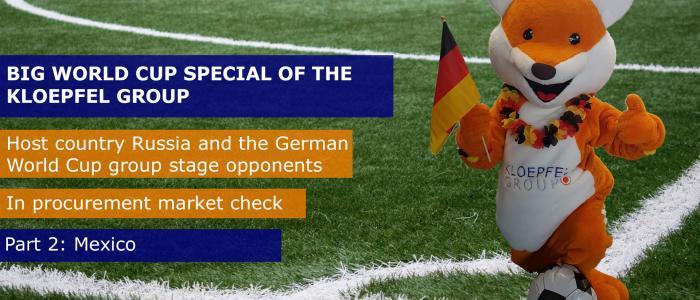Procurement Market Mexico – More than just Siesta!
When a loud whistle echoes through the Luschniki Stadium in Moscow at 5 p.m. on Sunday, the World Cup 2018 will also begin for the German national team. The scandalous (but not to be underestimated) opponent in the run-up to the World Cup is Mexico. “El Tricolor” may not be one of the big favorites for the title with 15th place in the world rankings, but they will do everything they can to shock the DFB’s line-up. In the course of the Kloepfel Group World Cup Special we take a look at Mexico as a procurement market and production location. Part two of our series.
Mexico as a production location and procurement market
Mexico exported goods worth 409.5 billion US dollars in 2017. This means that they only just missed the top 10 of the world’s largest export countries with the 12th place. The reason for this is Mexico’s steadily growing position as a production location for the automotive industry. The list of German automobile manufacturers with production sites in South America’s low-wage paradise is long and top-class: BMW, Volkswagen, Audi and Daimler are already planning or using plants in Mexico with six-digit production capacities. But the country is more than just an attractive production location. Large corporations as well as medium-sized companies increasingly rely on procurement in Mexico. What does this relate to and what does the market have there in advance of other procurement markets?
Investments bear fruit
Mexico has actually been undergoing a remarkable development in terms of infrastructure, level of education and efficiency for several years now. In 2014, the Mexican government announced its intention to invest 420 billion euros in the country’s infrastructure over a period of four years. Supported projects were road construction, the modernization of airports and the expansion of the rail network among other things. Not only manufacturing companies in Mexico benefit from this. The efficiency of Mexican manufacturers and suppliers is also increasing, which can mean cost advantages for sourcing companies as well. If you want to produce in Mexico, you can enjoy a greatly increased level of education in recent years. The unemployment rate of the US neighbor is currently estimated at 3.5 percent, which is not least due to the high investments in the education of their citizens. Economic growth of 2.91 percent (2016) also confirms Mexico’s position as an economically stable production and procurement country.
Variety of minerals and goods
Another trademark of the country is the high variety of raw materials and products available to procuring companies. Examples of raw materials found in Mexico are crude oil, natural gas, platinum, silver, gold or diamond. The country is still one of the largest metal ore producers in the world. In 2016, Mexico was the world’s largest producer of silver, what highlights the relevance of mining and minerals in Mexico. But the product range of Mexican suppliers is also impressive: While cars and vehicle parts account for the majority of exports, computers and telephones also account for a high proportion of Mexican exports. In addition, the strong automotive industry means that a large number of high-quality suppliers are based in Mexico. These suppliers can also become interesting for companies outside the automotive industry. This is how companies can benefit from localization.
Economic conditions
The North American Free Trade Agreement (NAFTA) between Mexico, Canada and the USA was signed in 1994. For car manufacturers producing in Mexico, this means enormous advantages when exporting to the states. However, the three parties are currently in renegotiations demanded by the US, which, depending on the outcome, could harm Mexico in the long term. At the same time, the European Union (EU) is negotiating a renewed common free trade agreement with Mexico, which would allow duty-free trade of almost all goods between Mexico and the EU. The latter negotiations should have recently achieved a breakthrough, which would be particularly important in view of pressure from US President Donald Trump. If he extends the punitive tariffs, a major free trade agreement between Mexico and the EU could help to offset the losses it incurs.
Procurement also associated with risks
Everyone wishing to integrate Mexico into their procurement activities in the long term should also be aware of the associated risks. The south of the country in particular is considered as prone to earthquakes. The region, including large metropolises such as Mexico City, is often shaken by strong earthquakes. This threatens the lives of local people and also poses a supply risk for companies. Another risk factor lives right next door and is called Donald Trump. Bilateral relations between Mexico and the United States suffer under the Republican president, who has already called for the construction of a wall, threatened to terminate the NAFTA agreement and issued warnings to Mexico investors from the automotive industry. However, it remains to be seen how consistently these measures will be implemented in the future.
Conclusion
Mexico holds enormous potential for companies both as a production location and as a procurement market. However, tapping this potential represents a major challenge. Companies without prior knowledge of Mexico should not do this on their own. For European companies it makes sense to look for an established partner in Mexico who knows the market and can assess political and economic developments. Nevertheless, a functioning risk management is important in order to prevent potential supply bottlenecks. This provides a stable foundation for production or procurement in Mexico, which can generate long-term returns in a growing market.
About the author
Thomas Wandler, Partner at Kloepfel Consulting, and Hector Galindo, Senior Consultant, are experts in purchasing and procurement in Mexico. As project managers, they have already managed a wide variety of projects in Mexico and gained market experience.
Would you also like to benefit from the know-how of our experts? Then feel free to contact us at +49 211 875 453 23 or at info@kloepfel-consulting.com.
Part 1: Procurement market Russia – The host country of the World Cup in the check
Part 3: Procurement market Sweden – How strong is our preliminary round opponent?
Part 4: Procurement market South Korea – The opponent of the World Cup in the check
Part 5: Procurement market Switzerland – Our neighboring country in check
Part 6: Procurement market Brazil: Is everything sweet in the land of the Sugarloaf Mountain?



Comments are closed.